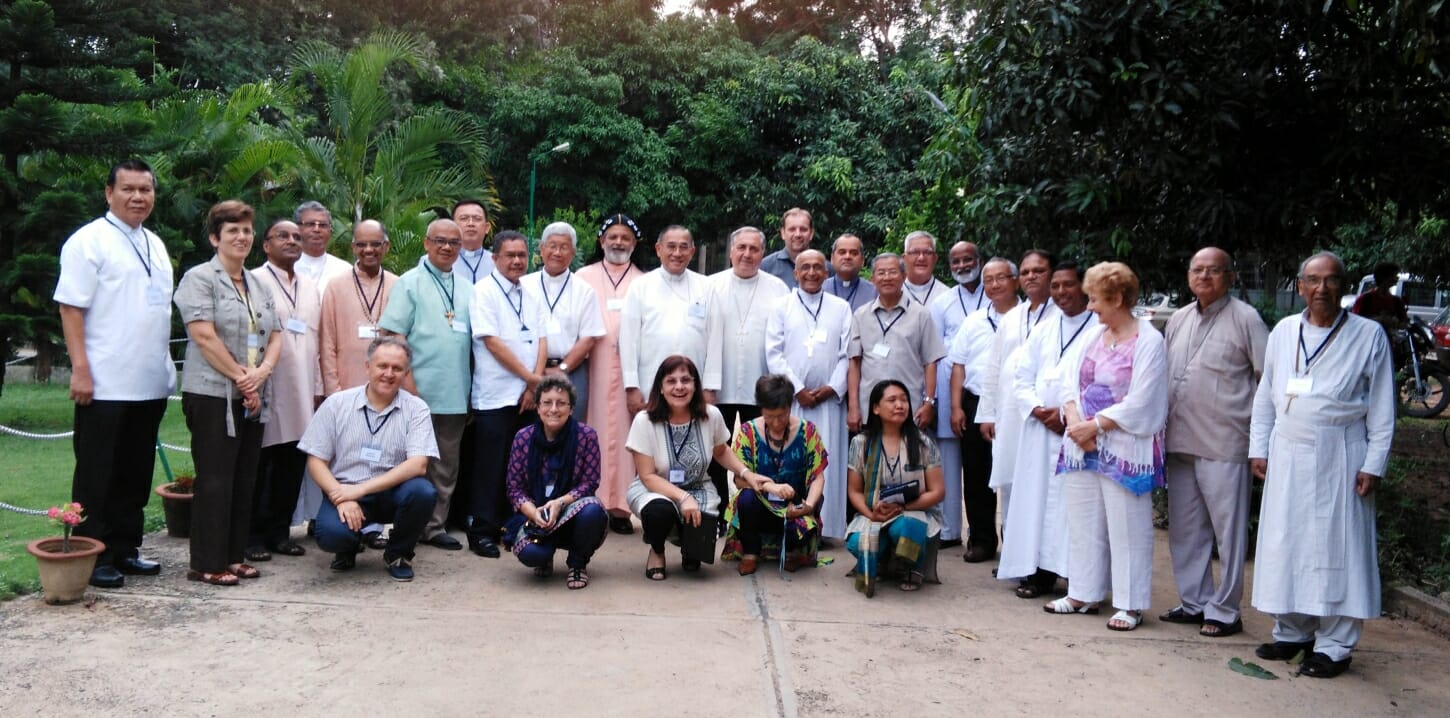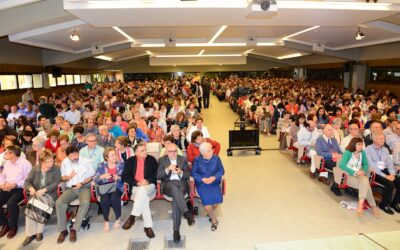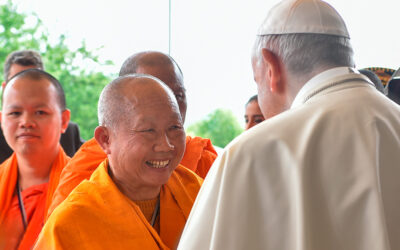 “Upon my arrival, the first person I saw was the cardinal who took my bag. The art of loving, which Chiara Lubich speaks about in such a simple way, is life.” So says Mons. Ignatius Mascarenhas, bishop of Chandigarh, India, one of the 22 Catholic Bishops-Friends of the Focolare Movement reunited in Bangalore from June 3rd to 6th for a pan-Asian meeting. For the first time, among these, there are 12 Indian bishops and one bishop from Pakistan. This meeting was preceded by a preparatory meeting with a few bishops, who went together to visit the sick in a nearby hospital, to stress how contemplation is not separate from action, in the desire to be instruments of God’s mercy. The bishop from Pakistan lives near the border between Pakistan and India. He shared his pastoral experience: “Two weeks ago I was in a great desert near the border. For three days I was with a priest, visiting small towns who have been suffering for the last two years because of the drought. The children are dying. I celebrated the Mass using a box as an altar. Many people came, among them even a few Hindus. During the Mass we prayed that the rain would come.” The Indian bishops and the Pakistani bishop celebrated together: “It’s a sign of hope,” affirms Mons. Bobet Callari from the Philippines. Why the choice of India as the location to host this meeting? India, with its billion and 250 million inhabitants, in which Christians are only 3% of the population, represents a frontier for interreligious coexistence. The bishops, pastors of small communities, live in contact with people of other creeds, faiths, cultures. The “dialogue of life” must therefore precede any theological discourse, and communion, the affinity between the bishops (like that which was reinforced during the meeting and sealed by a “pact of mutual love”) is a great antidote against the discouragement which often seems at risk of prevailing. “In my diocese,” recounts Stephen Lepcha, Bishop of Darjeeling (West Bengala), “I have a lot of difficulty with some sects which sow seeds of hate and which put us to the test. I know it will continue to happen, but during these few days I have understand what to do: love with the love that comes from God, because be they Hindus, Muslims, Christians…they are children of God.” “We need the spirituality of communion,” affirms Mons. Elias Gonsalves, from the diocese of Amravati, India. “At times we are left alone. Communion between the bishops is very important, it helps the youngest but also the most elderly. We must improve our capacity to help one another reciprocally.” At the meeting, Hindu Professor Shubada Joshi also spoke, about her meeting with Chiara Lubich and the charism of unity. In fact, in 2002 Chiara, during a Hindu-Christian symposium, had shared with a group of Hindus her mystical experience of the summer of 1949, experiencing that with them, dialogue can be based on a plane of spiritual depth which is not always possible with others. The words of Shubada Joshi, along with the School for Oriental Religions (SOR), which took place in the preceeding months in Tagaytay in the Philippines, gave a panoramic view of the proposal of interreligious dialogue which starts from the spirituality of the Focolare. The meeting with the community of Bangalore, with various testimonies from families and young people, offered a cross-section of daily life lived in the light of fraternity.
“Upon my arrival, the first person I saw was the cardinal who took my bag. The art of loving, which Chiara Lubich speaks about in such a simple way, is life.” So says Mons. Ignatius Mascarenhas, bishop of Chandigarh, India, one of the 22 Catholic Bishops-Friends of the Focolare Movement reunited in Bangalore from June 3rd to 6th for a pan-Asian meeting. For the first time, among these, there are 12 Indian bishops and one bishop from Pakistan. This meeting was preceded by a preparatory meeting with a few bishops, who went together to visit the sick in a nearby hospital, to stress how contemplation is not separate from action, in the desire to be instruments of God’s mercy. The bishop from Pakistan lives near the border between Pakistan and India. He shared his pastoral experience: “Two weeks ago I was in a great desert near the border. For three days I was with a priest, visiting small towns who have been suffering for the last two years because of the drought. The children are dying. I celebrated the Mass using a box as an altar. Many people came, among them even a few Hindus. During the Mass we prayed that the rain would come.” The Indian bishops and the Pakistani bishop celebrated together: “It’s a sign of hope,” affirms Mons. Bobet Callari from the Philippines. Why the choice of India as the location to host this meeting? India, with its billion and 250 million inhabitants, in which Christians are only 3% of the population, represents a frontier for interreligious coexistence. The bishops, pastors of small communities, live in contact with people of other creeds, faiths, cultures. The “dialogue of life” must therefore precede any theological discourse, and communion, the affinity between the bishops (like that which was reinforced during the meeting and sealed by a “pact of mutual love”) is a great antidote against the discouragement which often seems at risk of prevailing. “In my diocese,” recounts Stephen Lepcha, Bishop of Darjeeling (West Bengala), “I have a lot of difficulty with some sects which sow seeds of hate and which put us to the test. I know it will continue to happen, but during these few days I have understand what to do: love with the love that comes from God, because be they Hindus, Muslims, Christians…they are children of God.” “We need the spirituality of communion,” affirms Mons. Elias Gonsalves, from the diocese of Amravati, India. “At times we are left alone. Communion between the bishops is very important, it helps the youngest but also the most elderly. We must improve our capacity to help one another reciprocally.” At the meeting, Hindu Professor Shubada Joshi also spoke, about her meeting with Chiara Lubich and the charism of unity. In fact, in 2002 Chiara, during a Hindu-Christian symposium, had shared with a group of Hindus her mystical experience of the summer of 1949, experiencing that with them, dialogue can be based on a plane of spiritual depth which is not always possible with others. The words of Shubada Joshi, along with the School for Oriental Religions (SOR), which took place in the preceeding months in Tagaytay in the Philippines, gave a panoramic view of the proposal of interreligious dialogue which starts from the spirituality of the Focolare. The meeting with the community of Bangalore, with various testimonies from families and young people, offered a cross-section of daily life lived in the light of fraternity.
Get to know each other
Get to know each other




0 Comments